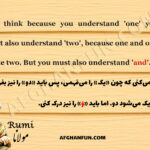Melting Away the Self: Rumi’s Path to Purity.
Be melting snow.
Rumi
Wash yourself of yourself.
The Melting Snow: Washing Yourself Clean, Rumi’s Way.
مثل برف آب شو و خود را از خود پاک کن.
مولانا
این عبارت زیبا و عمیق از مولانا، دعوتی است به پاکی و زدودن ناخالصیها از درون. به طور خلاصه، این عبارت به معنای موارد زیر است:
تغییر و تحول درونی: مانند ذوب شدن برف و تبدیل شدن به آب، انسان نیز باید از حالت جامد و سخت خود خارج شده و نرم و انعطافپذیر شود.
پاکی و طهارت: برف نماد پاکی است و این عبارت، انسان را به پاک کردن خود از آلودگیهای روحی و روانی دعوت میکند.
رهایی از خود: با ذوب شدن و پاک شدن، انسان از بند خودخواهی و خودبینی رها میشود.
در واقع، این عبارت، یک فراخوان برای تحول معنوی و رسیدن به کمال انسانی است.
Melting Into Transformation: Rumi’s Call to Self-Release.
Монанди барф об шав ва худро аз худ пок кун.
МАВЛОНО ҶАЛОЛУДДИН МУҲАММАДИ БАЛХӢ
Ин ибораи зебо ва чуқури Мавлоно, даъвати ба покию тоза кардани наҷосатҳо аз дарун аст. Ба таври мухтасар, ин ибора ба маънои инҳост:
Тағйир ва таҳаввули дохилӣ: мисли гудозидани барфу табдил шудан ба об, инсон низ бояд аз ҳолати сахту ҷамъшудаи худ берун ояд ва нарму мулоим гардад.
Покию тозагӣ: барф рамзи покист ва ин ибора, инсонро ба тоза кардани худ аз олудагиҳои рӯҳӣ ва рӯҳонӣ даъват мекунад.
Озод шудан аз худ: бо гудозидану тоза шудан, инсон аз банди худхоҳӣ ва худбинӣ озод мешавад.
Дар асл, ин ибора, як даъват ба таҳаввули маънавӣ ва расидан ба камоли инсонӣ аст.
Be Melting: A Rumi Guide to Spiritual Cleansing.
كن مثل الثلج ذائباً وطهر نفسك من نفسك.
مولانا جلال الدین محمد الرومي
هذه العبارة الجميلة والعميقة من مولانا، دعوة إلى الطهارة وتطهير النفس من الأدران. باختصار، تعني هذه العبارة ما يلي:
التغيير والتحول الداخلي: مثل ذوبان الثلج وتحوله إلى ماء، يجب على الإنسان أيضًا أن يخرج من حالته الصلبة الجامدة ويصبح لينًا ومرنًا.
الطهارة والنقاء: الثلج رمز للنقاء وهذه العبارة تدعو الإنسان إلى تطهير نفسه من الأوساخ الروحية والنفسية.
التحرر من الذات: بالذوبان والتنقية، يتحرر الإنسان من أسر الأنانية والغرور.
في الواقع، هذه العبارة هي دعوة للتحول الروحي والوصول إلى الكمال الإنساني.
This Rumi quote, “Be melting snow. Wash yourself of yourself,” is a profound reflection on spiritual transformation and self-transcendence. Let’s break it down and explore its deeper meanings, layer by layer:
“Be melting snow.”
- Metaphor of Melting Snow: Snow, in many spiritual traditions, symbolizes purity, coldness, and detachment. It can also represent something that is stagnant or frozen, untouched by the flow of life. The idea of “melting snow” suggests a process of transformation where something rigid and cold becomes fluid and open. Snow, when it melts, becomes part of the water cycle again—flowing, renewing, merging with something larger. It symbolizes letting go of the solid, fixed parts of yourself and becoming more fluid and adaptable.
- Spiritual Transformation: In Sufism, the melting snow could symbolize the dissolving of the ego, the shedding of the “false self” that holds you back from experiencing a deeper, more interconnected sense of being. Just as snow melts into water, a person must “melt” their rigid self-identity to merge with the Divine, the eternal, or the universal spirit.
- Releasing the Ego: The snow here is a metaphor for the hard, crystallized ego that separates us from the truth of who we are. To “be melting snow” means to soften the ego’s grip, to loosen our attachment to identity, status, or pride.
- Impermanence and Flow: Snow is transient—it’s here one moment and gone the next. The idea of “melting snow” also implies the impermanence of all things. Life is constantly in flux, and to be stuck in one form, rigid and unyielding, is to resist the natural flow of existence. To melt like snow is to embrace change, to allow ourselves to evolve, to let go of our attachments and trust the process of transformation.
“Wash yourself of yourself.”
- Purification: The act of washing is symbolic of purification. In many religious and spiritual practices, washing or cleansing rituals are seen as a way of removing impurities—whether physical, mental, or spiritual. “Washing yourself of yourself” is about shedding the layers of ego, pride, and illusion that cloud your perception of your true nature. It calls for a deep inner cleansing, a stripping away of everything that is false or extraneous in your identity.
- Selflessness: To wash yourself of yourself can also mean letting go of the ego’s obsession with “self”—its desire for recognition, control, and distinction. In Sufi thought, the ego (or “nafs”) is often seen as the source of attachment and suffering. To wash it away is to detach from the limited sense of self and make space for the divine essence to flow through you. This aligns with the idea of “annihilation of the self” (fana) in Sufi mysticism, where the individual self dissolves into the presence of the Divine.
- Selflessness: To wash yourself of yourself can also mean letting go of the ego’s obsession with “self”—its desire for recognition, control, and distinction. In Sufi thought, the ego (or “nafs”) is often seen as the source of attachment and suffering. To wash it away is to detach from the limited sense of self and make space for the divine essence to flow through you. This aligns with the idea of “annihilation of the self” (fana) in Sufi mysticism, where the individual self dissolves into the presence of the Divine.
- Rebirth and Renewal: Washing also symbolizes a form of rebirth, a renewal. Just as we wash away dirt to reveal clean skin, washing yourself of yourself suggests that there is a deeper, truer self beneath the layers of illusion. It’s an invitation to reconnect with your essence, your core, untainted by the social roles or the narrative your mind has constructed.
- Letting Go of Attachment to Self-Image: “Yourself” in this phrase represents the identity you’ve built around your experiences, beliefs, and societal roles. To wash yourself of this is to free yourself from the prison of self-image—the idea that you are defined by what you do, what you have, or how others perceive you. Rumi is urging us to transcend our limited sense of self, to let go of any rigid sense of “who we are,” and move toward a more expansive and authentic way of being.
Integrating the Two Phrases
Both parts of the quote emphasize the idea of transformation. The “melting snow” is the process of dissolving the hard, frozen ego, and “washing yourself of yourself” is the act of cleansing yourself from the attachment to a constructed, limited identity. Together, they convey a message of liberation, urging you to soften your attachment to the ego, to allow yourself to flow freely with life, and to purify your heart and mind of illusions.
In a broader sense, this quote speaks to the concept of spiritual awakening. It invites us to be like the snow that melts away into the vastness of the sea, to wash away the false constructs we identify with so that we can return to a state of purity, openness, and unity with the Divine. It’s an invitation to transcend the individual, separate self and merge with the oneness of existence.
Concluding Thoughts
Rumi’s words are not just a poetic description of spiritual practice; they are an instruction for living a life of humility, surrender, and deep spiritual connection. To “be melting snow” and “wash yourself of yourself” means to let go of everything that stands between you and the Divine, between you and your truest nature, between you and others. It is a call to dissolve the boundaries that separate you from the world around you, to melt into the flow of life, and to experience yourself as part of something far greater than the individual self.
In essence, this quote is a profound teaching on the need for inner purification, surrender, and the letting go of the ego in order to embrace a higher, more fluid way of being. It is an invitation to spiritual freedom and transformation.
External links:
This Rumi quote, found on “Goodreads“











